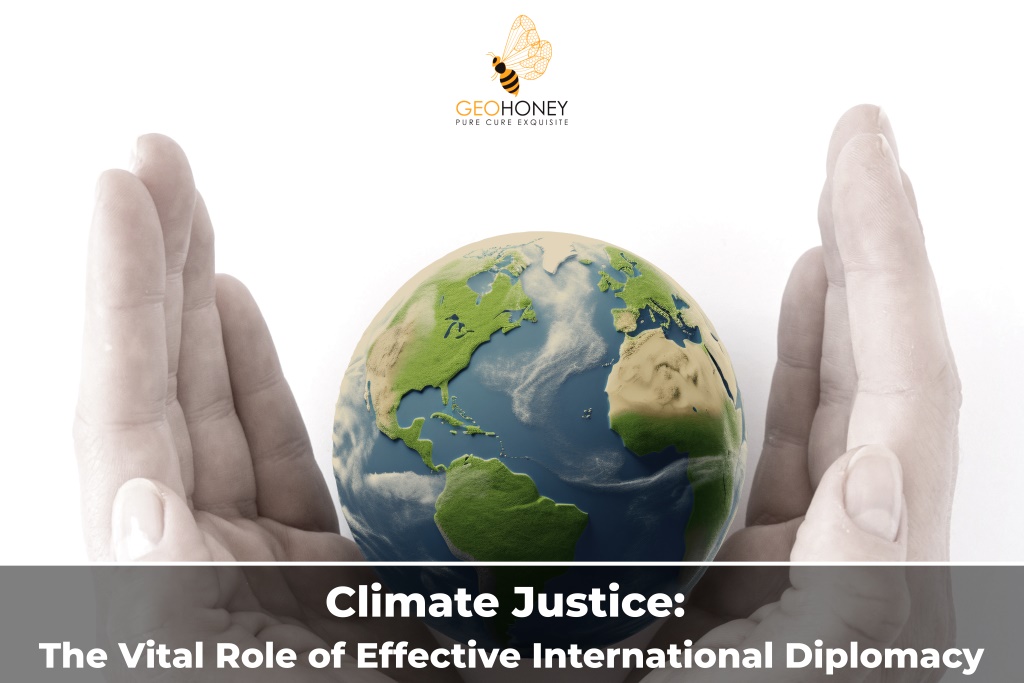- Tokyo: 16:51
- Singapore: 15:51
- Dubai: 11:51
- London: 07:51
- New York: 02:51
For Climate Justice, Effective International Diplomacy is Essential

To address the urgent global issue of climate change and work toward sustainable solutions for a better future, the entire community must come together. Fighting climate change requires strong international cooperation. This post highlights the urgency of the situation and stresses the necessity for teamwork in a novel approach.
Innovative Methods for an Ecological Future
The globe is at a crossroads as it deals with the disastrous repercussions of climate change. In light of this pressing global issue, it is more crucial than ever for the world community to unite and collaborate in order to find long-term solutions that could mitigate the foreboding catastrophe. International cooperation is needed for this, but it would be better to look at innovative strategies and initiatives that support the development of a sustainable future. By coordinating their efforts, nations may pool their resources and experiences to confront the multifaceted problems brought on by climate change.
Responding to a Changing Environment: A Call for Global Cooperation
Since climate change is no longer only a theoretical worry, its consequences are being felt globally. Nations must come together and show solidarity in the face of this terrible disaster.
The initial stage in the joint effort to tackle climate change is a detailed understanding of the risks and vulnerabilities that different locations face. By pooling their resources and knowledge, nations may develop resilience tactics and adaptation measures to shield populations from the detrimental effects of climate change. We can improve our response to climate change and build a more resilient and sustainable environment for future generations by cooperating on a global scale.
Creating a Greener Future: The Need for International Cooperation
In the face of the pressing threat of climate change, it is imperative that we work together to pave the way for a sustainable and greener future. By mobilizing resources, exchanging cutting-edge technology, and enacting new legislation, the world can collectively reduce greenhouse gas emissions and transition to renewable energy sources. This collaborative effort not only mitigates the impact of climate change but also lays the foundation for a more resilient and environmentally-friendly world.
Despite the anticipation surrounding COP28, the summit has sparked contentious debates. Some argue that the appointment of Sultan Al Jaber, with his background in the oil industry, presents a conflict of interest, while others believe it positions him well to align the fossil fuel sector with climate commitments. Consequently, there is considerable disagreement regarding the outcomes of the climate summit.
The focal point of attention has been a historic agreement that mandates all countries to move away from fossil fuels for the first time. This landmark agreement is applauded for addressing the root cause of the climate crisis and commits to tripling global renewable energy production while limiting global warming to 1.5°C above pre-industrial levels. However, it has also faced criticism for omitting a clear mention of phasing out fossil fuels and leaving gaps that could allow highly polluting nations to continue business as usual.
While we appreciate the acknowledgment of fossil fuels' responsibility in the recent COP28 agreement, it is crucial to recognize that mere words are no longer sufficient. Concrete and measurable actions need to be taken in response. Climate justice advocates and leaders of vulnerable countries have expressed dissatisfaction with the agreement's lack of clarity on climate financing, despite the need for trillions of dollars. Moreover, the current level of financial support falls short, even with the operationalization of the loss and damage fund. The agreement's failure to acknowledge historical culpability for the climate crisis raises questions about the willingness of wealthier nations, who have benefited from fossil fuel burning, to fulfill their duty in assisting poorer nations in confronting and adapting to the climate challenges they helped create.
This trend is concerning for nations like Bangladesh, as it hinders the successful implementation of national climate action plans for adaptation and mitigation without explicit financial commitments. The lack of urgency and political will from the developed world to support global action has persisted over the years, despite the severity of the climate catastrophe. While it is commendable that the recent COP28 agreement recognizes the responsibility of fossil fuels, it is paramount that we emphasize the need for measurable steps to support these declarations, as words alone are no longer sufficient.
Source: myrepublica.nagariknetwork.com




The vital role is to make great leaders as one, to cooperate, unite and to work as one.
INTERNATIONAL DIPLOMACY is badly needed, why? Because it is a crucial or vital point in fighting against climate change. THE COOPERATION, THE UNITY.